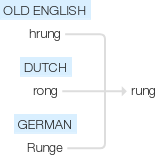Rung
Old English hrung (in rung1 (sense 2)); related to Dutch rong and German Runge .
wiktionary
From Middle English[Term?], from Old English hrung, from Proto-Germanic *hrungō. Compare Gothic 𐌷𐍂𐌿𐌲𐌲𐌰( hrugga, “a staff”).
See the etymology of the corresponding lemma form.
etymonline
rung (n.)
late Old English hrung "rod, cross-bar; stout, rounded stick," from Proto-Germanic *khrungo (source also of Middle Low German runge, Old High German runga "stake, stud, stave," German Runge "stake, stud, stave," Middle Dutch ronghe, Dutch rong "rung," Gothic hrugga "staff"), a word of unknown origin with no connections outside Germanic if as is supposed the Celtic words are from English.
The sense in English narrowed to mean usually "round or stave of a ladder" (attested from late 13c.), but usage of cognate words remains more general in other Germanic languages.
This [rungs] has generally been considered as a mere corruption of rounds; and people of education use only this latter word. [John Pickering, "A Vocabulary or Collection of Words and Phrases which have been Supposed to be Peculiar to the United States of America," Boston, 1816]
